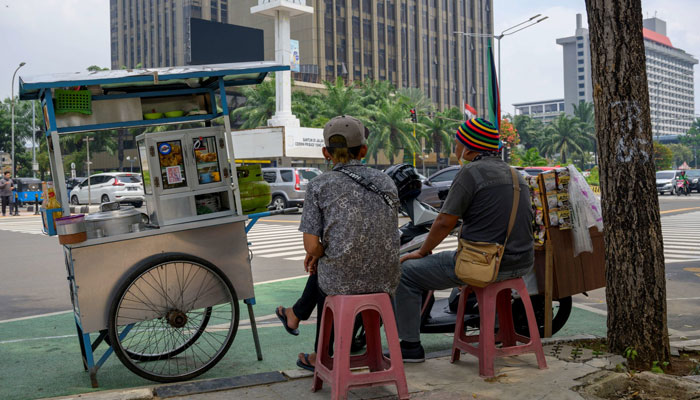Indonesia’s economy suffers first full-year slump in over two decades in 2020
Jakarta: Indonesia on Friday logged its first annual contraction since the 1998 Asian financial crisis, as the coronavirus pandemic slammed Southeast Asia´s biggest economy.
The country´s gross domestic product fell 2.07 percent in 2020 from a year earlier, the statistics agency said, with household spending, transportation and tourism among the hardest-hit sectors.
Friday´s data marked the first time Indonesia´s economy contracted on a full-year basis since it was in the depths of the regional currency crisis which helped force the resignation of its long-term dictator Suharto in 1998.
Indonesia’s economy fell into recession last year as the country struggled to get its COVID-19 outbreak under control. It has the highest caseload and death toll from the respiratory disease in Southeast Asia.
"The Covid-19 pandemic has hit the whole world, including Indonesia," said statistics agency chief Suhariyanto, who like many Indonesians goes by one name.
Indonesia has some of the worst virus infection rates in Asia, and President Joko Widodo has been widely criticised over his government´s handling of the pandemic, which appeared to prioritise the economy.
Several million Indonesians have been laid off or furloughed as the central bank repeatedly cut interest rates in a bid to prop up the sagging economy.
The statistics agency chief said that some indicators, including trade data, showed signs of picking up last month,
The government, which rolled out a nearly $50 billion stimulus plan, is forecasting the economy to expand by about 5.0 percent this year.
Indonesia has launched one of the world´s biggest mass vaccination drives.
"The vaccination programme and adherence to health protocols are important keys to an economic recovery," Suhariyanto said.
But analysts warned that any recovery was likely to be slow as Indonesia moves to inoculate many of its nearly 270 million people, the world´s fourth-largest population.
"The government is betting that the vaccines will offer an escape route from the economic and public health crisis... (but) the path to recovery for Indonesia will be a challenging and protracted one," Moody´s Analytics said after the GDP data was published.
The government will focus on accelerating spending and attracting investment to further boost the economic recovery, Indonesia’s top economics minister Airlangga Hartarto said on Friday, giving a forecast for 1.6% to 2.1% growth in the first quarter of 2021.
The data on Friday showed household consumption, which represents more than half of Indonesia’s GDP, shrank more slowly in the fourth quarter.
It contracted 3.6% after a 4.1% slump in the previous three months, partly due to a temporary easing of coronavirus restrictions. Jakarta imposed a second round of coronavirus curbs between September and October, and restrictions were reinstated last month due to a spike in cases.
Investment fell 6.2% after 6.5% drop in the previous quarter. Government spending was up just 1.8%, well below the previous quarter’s 9.8% growth.
Wellian Wiranto, OCBC economist, revised down his bank’s outlook for 2021 GDP growth to 4.9% from 5.2% following the data and predicted stronger support from policymakers.
“Looking at the details of the data, momentum in key components appears to remain rather weak, signalling that the hope for a smooth-sailing recovery in the early months of 2021 may be challenged,” he said.
Finance Minister Sri Mulyani Indrawati said this week she would boost the government’s economic recovery budget in 2021 to nearly match the 692.5 trillion rupiah ($49.39 billion) allocated for pandemic relief programmes last year.
Bank Indonesia, which delivered 125 basis points of rate cuts last year and pumped $50 billion of liquidity into financial markets, has pledged to use all policy instruments to support the economic recovery in 2021.
-
 Jerome Tang Calls Out Team After Embarrassing Home Defeat
Jerome Tang Calls Out Team After Embarrassing Home Defeat -
 Cynthia Erivo Addresses Bizarre Rumour About Her Relationship With Ariana Grande
Cynthia Erivo Addresses Bizarre Rumour About Her Relationship With Ariana Grande -
 Prince Harry, Meghan Markle Spotted Cosying Up At NBA All-Star Game
Prince Harry, Meghan Markle Spotted Cosying Up At NBA All-Star Game -
 Lady Gaga Explains How Fibromyalgia Lets Her 'connect With People Who Have It'
Lady Gaga Explains How Fibromyalgia Lets Her 'connect With People Who Have It' -
 Metro Detroit Weather Forecast: Is The Polar Vortex Coming Back?
Metro Detroit Weather Forecast: Is The Polar Vortex Coming Back? -
 Daniel Radcliffe Reveals Surprising Way Fatherhood Changed Him
Daniel Radcliffe Reveals Surprising Way Fatherhood Changed Him -
 ‘Disgraced’ Andrew At Risk Of Breaking Point As Epstein Scandal Continues
‘Disgraced’ Andrew At Risk Of Breaking Point As Epstein Scandal Continues -
 Alan Cumming Shares Plans With 2026 Bafta Film Awards
Alan Cumming Shares Plans With 2026 Bafta Film Awards -
 OpenClaw Founder Peter Steinberger Hired By OpenAI As AI Agent Race Heats Up
OpenClaw Founder Peter Steinberger Hired By OpenAI As AI Agent Race Heats Up -
 Kate Middleton's Reaction To Harry Stepping Back From Royal Duties Laid Bare
Kate Middleton's Reaction To Harry Stepping Back From Royal Duties Laid Bare -
 Rose Byrne Continues Winning Streak After Golden Globe Awards Victory
Rose Byrne Continues Winning Streak After Golden Globe Awards Victory -
 Ice Hockey Olympics Update: Canada Stays Unbeaten With Dominant Win Over France
Ice Hockey Olympics Update: Canada Stays Unbeaten With Dominant Win Over France -
 Brooklyn Beckham Makes This Promise To Nicola Peltz Amid Family Feud
Brooklyn Beckham Makes This Promise To Nicola Peltz Amid Family Feud -
 Chinese New Year Explained: All You Need To Know About The Year Of The Horse
Chinese New Year Explained: All You Need To Know About The Year Of The Horse -
 Canadian Passport Holders Can Now Travel To China Visa-free: Here's How
Canadian Passport Holders Can Now Travel To China Visa-free: Here's How -
 Maya Hawke Marries Christian Lee Hutson In New York Ceremony
Maya Hawke Marries Christian Lee Hutson In New York Ceremony




